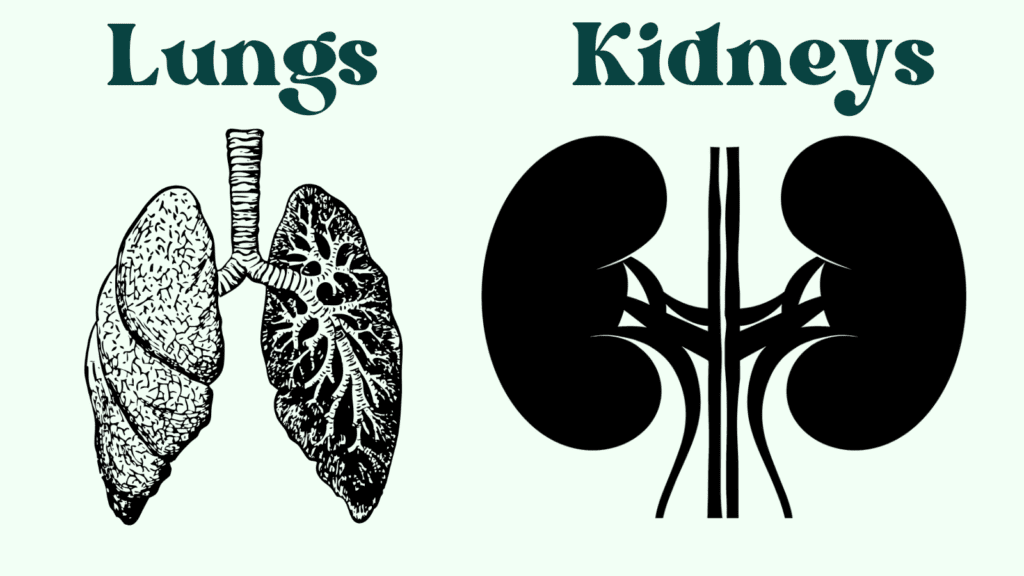The Dynamic Duo: Understanding the Connection Between Lungs and Kidneys

Our bodies are marvelously complex systems, with each organ playing a vital role in maintaining our health. Two such organs that often don’t seem connected at first glance are the lungs and kidneys. While they may appear unrelated, these two organs share a fascinating and intricate relationship that affects our overall well-being. In this blog post, we will delve into the functions of the lungs and kidneys and explore how they work together to keep us healthy.
The Lungs: The Oxygen Factories
The lungs are a pair of cone-shaped organs situated within the chest cavity. Their primary function is to facilitate the exchange of oxygen and carbon dioxide, a process essential for the survival of every cell in our body. Here’s a brief overview of how the lungs accomplish this vital task:
- Inhalation: When we breathe in, air enters our respiratory system through the nose or mouth, travels down the trachea, and enters the lungs through the bronchial tubes.
- Gas Exchange: Within the lungs, air is directed into tiny air sacs called alveoli, where oxygen from the air passes into the bloodstream, binding to hemoglobin in red blood cells. Simultaneously, carbon dioxide is removed from the blood and expelled when we exhale.
- Exhalation: After the exchange, the now oxygen-poor and carbon dioxide-rich blood is pumped by the heart back to the lungs, where the carbon dioxide is exchanged for fresh oxygen. This oxygenated blood is then circulated throughout the body, supplying our organs and tissues with the oxygen they need to function.
The Kidneys: The Body’s Filtration System
The kidneys are bean-shaped organs located on either side of the spine, below the ribcage. Their primary role is to filter waste products and excess substances from the blood to form urine. While this function might seem unrelated to the lungs’ role in oxygen exchange, the kidneys play a crucial role in maintaining a stable internal environment. Here’s how they achieve this:
- Filtration: The kidneys receive around 20% of the blood pumped by the heart, allowing them to filter waste products like urea, creatinine, and excess salts, as well as excess water, from the bloodstream.
- Regulation of Electrolytes: They also play a pivotal role in maintaining the balance of electrolytes such as sodium, potassium, calcium, and phosphate in the blood. These electrolytes are essential for various bodily functions, including nerve signaling and muscle contraction.
- Blood Pressure Regulation: The kidneys help regulate blood pressure by releasing the enzyme renin, which acts on blood vessels to control blood pressure.
The Connection Between Lungs and Kidneys
Now that we understand the functions of these two vital organs, let’s explore their connection:
- Oxygen and Blood Chemistry: The lungs supply oxygen to the bloodstream, ensuring that the blood has an adequate oxygen supply for the body’s needs. This oxygenated blood is essential for the kidneys to function optimally. Insufficient oxygen in the blood can lead to kidney dysfunction.
- Acid-Base Balance: The kidneys help maintain the body’s acid-base balance, which is crucial for normal cellular function. The carbon dioxide generated by cell metabolism is removed by the lungs during exhalation. If the lungs fail to eliminate excess carbon dioxide, it can lead to an imbalance in blood pH, which the kidneys must then work to correct.
- Fluid Balance: The kidneys regulate fluid balance by adjusting the volume of urine produced. If the lungs aren’t removing enough carbon dioxide, the body may respond by increasing breathing rate (respiratory compensation), which can affect fluid balance. Kidneys must then adapt to these changes.
The Impact of Lung and Kidney Health
Maintaining the health of both your lungs and kidneys is essential for overall well-being. Let’s delve a bit deeper into why the health of these two organs matters:
- Respiratory Diseases and Kidney Health: Lung conditions such as chronic obstructive pulmonary disease (COPD) and pneumonia can have a significant impact on kidney function. In severe cases, low oxygen levels in the blood can lead to kidney damage or even kidney failure. Conversely, kidney diseases that cause fluid retention can lead to pulmonary edema (fluid in the lungs), affecting lung function.
- Blood Pressure Regulation: As mentioned earlier, the kidneys play a crucial role in regulating blood pressure. High blood pressure can damage blood vessels in the lungs, potentially leading to conditions like pulmonary hypertension. Conversely, lung conditions that affect oxygen levels can put additional strain on the heart, impacting overall blood pressure regulation and potentially stressing the kidneys.
- Medications and Toxins: Both the lungs and kidneys are responsible for filtering toxins and medications from the bloodstream. Some medications used to treat lung conditions can have adverse effects on kidney function, and conversely, certain kidney conditions can affect how medications are metabolized in the body.
- Nutritional Balance: Adequate oxygenation is crucial for efficient metabolism. If the lungs are compromised and oxygen levels are low, the body may struggle to utilize nutrients efficiently. This can have downstream effects on the kidneys, which rely on a steady supply of nutrients and oxygen to function correctly.
- Inflammation and Immune Response: Lung infections and chronic lung diseases can trigger systemic inflammation and affect the immune system. Inflammatory responses can impact the kidneys and may contribute to kidney diseases.
Maintaining Lung and Kidney Health
- Don’t Smoke: Smoking is one of the leading causes of lung disease and can have harmful effects on kidney function as well. If you smoke, quitting is one of the most significant steps you can take for your overall health.
- Stay Active: Regular physical activity benefits both the lungs and kidneys. Exercise improves lung capacity and helps maintain a healthy weight, reducing the risk of lung and kidney diseases.
- Balanced Diet: A diet rich in fruits, vegetables, whole grains, lean proteins, and limited in salt and processed foods supports overall organ health. Proper nutrition ensures that both organs receive the nutrients they need to function optimally.
- Stay Hydrated: Proper hydration is essential for kidney health. It helps flush toxins from the body and supports overall circulation, benefiting lung health as well.
- Manage Chronic Conditions: If you have a chronic lung or kidney condition, it’s vital to follow your healthcare provider’s recommendations, take prescribed medications, and attend regular check-ups to monitor your condition.
- Restorative Sleep: Quality sleep is essential for the body’s overall health and recovery, including the lungs and kidneys. Aim for 7-9 hours of restful sleep each night to allow your body to repair and regenerate.
- Avoid Excessive Alcohol and Caffeine: Excessive alcohol and caffeine consumption can strain both the lungs and kidneys. Limit your intake of these substances to maintain organ health.
- Manage Stress: Chronic stress can negatively impact your overall health, including the lungs and kidneys. Practice stress-reduction techniques such as meditation, yoga, or deep breathing exercises to keep stress levels in check.
- Regular Check-Ups: Schedule regular check-ups with your healthcare provider to monitor the health of your lungs and kidneys. Early detection and management of any issues can prevent them from worsening.
- Stay Informed: Educate yourself about the risk factors, symptoms, and warning signs of lung and kidney diseases. Being aware of potential issues can prompt you to seek medical attention when needed.
- Follow Medication Instructions: If you are prescribed medications for lung or kidney conditions, take them as directed by your healthcare provider. Be aware of any potential side effects and communicate any concerns with your healthcare team.
- Avoid Environmental Toxins: Limit exposure to environmental toxins and pollutants, such as air pollution and industrial chemicals, which can harm both your lungs and kidneys.
- Stay Vaccinated: Vaccinations, especially those for respiratory illnesses like influenza and pneumonia, can help protect your lung health and indirectly benefit your kidneys by preventing secondary infections.
Maintaining the health of your lungs and kidneys is a crucial aspect of overall well-being. These two organs may have distinct functions, but their close interconnection highlights how changes in one can impact the other. By adopting a healthy lifestyle, staying vigilant about potential health issues, and seeking medical care when necessary, you can promote the harmonious functioning of this dynamic duo and enjoy a higher quality of life. Remember, your lungs and kidneys work tirelessly behind the scenes to keep you healthy—give them the care and attention they deserve.
Stay updated—subscribe now for informed empowerment!

